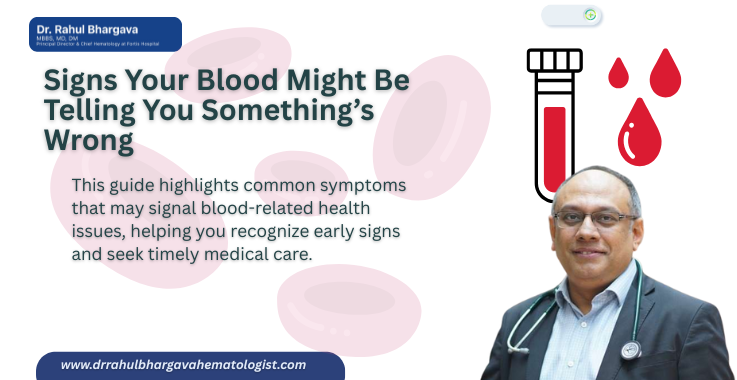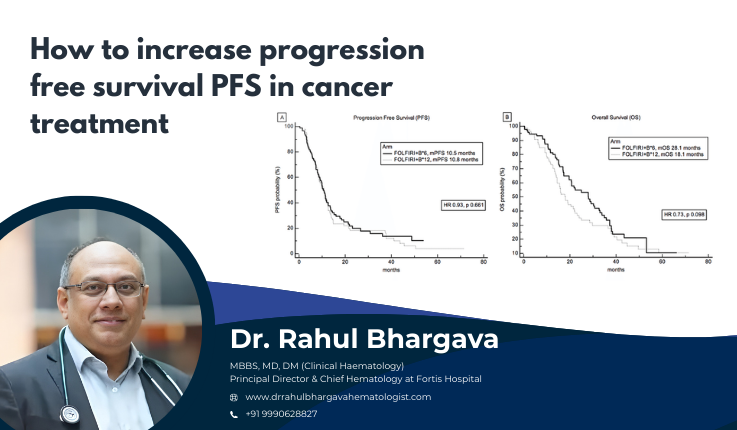Top Warning Signs Your Blood May Not Be Healthy

Table of Contents
Your blood plays a powerful role in keeping every organ of your body functioning smoothly. When something is wrong with your blood—your red cells, white cells, or platelets—your overall health gets affected quickly.
Unfortunately, the early signs of blood-related problems are often ignored because they look like normal fatigue or stress.
In this medically reviewed guide, we explain the top warning signs that your blood may not be healthy, helping you identify issues early and seek the right medical care.
Why You Should Trust This Information
Experience: Insights based on real patient symptoms commonly seen in hematology clinics.
Expertise: Content follows standard guidelines used by hematologists and international cancer-care bodies.
Authoritativeness: Focus on blood components (RBC, WBC, Platelets) and disorders such as anemia, leukemia, clotting disorders, and infections.
Trust: Information is simplified, accurate, and meant for awareness—not self-diagnosis. Always consult a qualified hematologist for proper evaluation.
1. Persistent Fatigue and Weakness
Feeling tired occasionally is normal.
But constant fatigue and low energy—even after proper sleep—can indicate:
- Low red blood cells (anemia)
- Iron deficiency
- Vitamin B12 or folate deficiency
- Bone marrow disorders
When your blood cannot carry enough oxygen, your muscles and organs become weak.
Chronic fatigue should never be ignored.
2. Pale or Yellow Skin
Changes in skin colour can signal issues in your blood:
- Pale skin, lips, or nails → Low hemoglobin or anemia
- Yellowish skin (jaundice) → RBC breakdown or liver involvement
- Ashen or greyish tone → Low oxygen levels
These changes are easily noticeable and should prompt blood testing.
3. Unexplained Bruising or Bleeding
If you bruise easily or bleed more than usual, it may be due to:
- Low platelets (thrombocytopenia)
- Clotting disorders
- Vitamin K deficiency
- Blood cancers like leukemia
Warning signs include:
- Frequent nosebleeds
- Bleeding gums
- Bruises without injury
- Heavy menstrual bleeding
These symptoms require immediate consultation with a hematologist.
4. Frequent Infections
If you constantly fall sick or take a long time to recover, your white blood cells (WBCs) may be low.
Possible reasons:
- Immune system disorders
- Bone marrow suppression
- Side effects of medications
- Blood cancers affecting immunity
Repeated infections, fever, or long-lasting cold-like symptoms should be investigated.
5. Shortness of Breath or Rapid Heartbeat
When blood quality is poor, oxygen delivery drops. This causes:
- Breathlessness even after mild activity
- Rapid or irregular heartbeat
- Feeling light-headed or dizzy
These are classic signs of anemia or low oxygen levels and should not be ignored.
6. Swelling in Lymph Nodes
Swollen lymph nodes in the:
- Neck
- Underarms
- Groin
may indicate: - Infection
- Immune disorder
Rarely, lymphoma or leukemia
If the swelling persists for more than two weeks or keeps increasing, you must seek medical evaluation.
7. Numbness, Tingling, or Cold Hands and Feet
Poor blood health affects circulation.
You may experience:
- Tingling sensations
- Cold extremities
- Numbness in hands or feet
Vitamin deficiencies (especially B12), anemia, and circulation issues commonly cause these symptoms.
8. Unintentional Weight Loss or Loss of Appetite
Sudden, unexplained weight loss can indicate:
- Chronic blood disorders
- Chronic infections
- Overactive immune system
- Hematological cancers
If you are losing weight without trying, consult a specialist.
9. Frequent Headaches or Dizziness
Low hemoglobin means less oxygen reaches your brain. This can cause:
- Constant headaches
- Fainting spells
- Blurred vision
- Difficulty concentrating
These symptoms are common in anemia and clotting disorders.
10. Persistent Fever or Night Sweats
A fever that comes and goes for weeks—especially without infection—can be a sign of:
- Blood cancer
- Autoimmune disorders
- Chronic infections
Night sweats are also a classic symptom in lymphoma patients.
When Should You See a Hematologist?
You should consult a specialist if you notice:
- One strong symptom, or
- A combination of mild symptoms persisting for more than 2–4 weeks
A hematologist will recommend:
- Complete blood count (CBC)
- Peripheral blood smear
- Iron, B12, folate tests
- Bone marrow evaluation (only if required)
- Imaging or advanced tests
Early detection leads to better outcomes.
